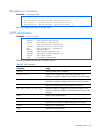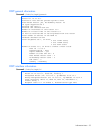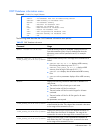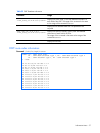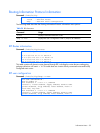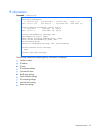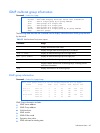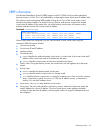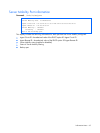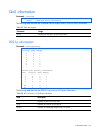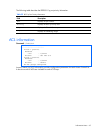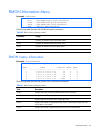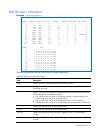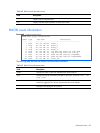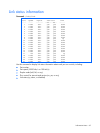
Information Menu 62
VRRP information
Virtual Router Redundancy Protocol (VRRP) support on the HP 10GbE switch provides redundancy
between routers in a LAN. This is accomplished by configuring the same virtual router IP address and
ID number on each participating VRRP-capable routing device. One of the virtual routers is then
elected as the master, based on a number of priority criteria, and assumes control of the shared
virtual router IP address. If the master fails, one of the backup virtual routers will assume routing
authority and take control of the virtual router IP address.
Command: /info/l3/vrrp
VRRP information:
1: vrid 2, 205.178.18.210, if 1, renter, prio 100, master, server
2: vrid 1, 205.178.18.202, if 1, renter, prio 100, backup
3: vrid 3, 205.178.18.204, if 1, renter, prio 100, master, proxy
When virtual routers are configured, you can view the status of each virtual router using this
command. VRRP information includes:
• Virtual router number
• Virtual router ID and IP address
• Interface number
• Ownership status
○ owner identifies the preferred master virtual router. A virtual router is the owner when the IP
address of the virtual router and its IP interface are the same.
○ renter identifies virtual routers which are not owned by this device
• Priority value. During the election process, the virtual router with the highest priority becomes
master.
• Activity status
○ master identifies the elected master virtual router.
○ backup identifies that the virtual router is in backup mode.
○ init identifies that the virtual router is waiting for a startup event. Once it receives a startup
event, it transitions to master if its priority is 255, (the IP address owner), or transitions to
backup if it is not the IP address owner.
• Server status. The server state identifies virtual routers.
• Proxy status. The proxy state identifies virtual proxy routers, where the virtual router shares the
same IP address as a proxy IP address. The use of virtual proxy routers enables redundant
switches to share the same IP address, minimizing the number of unique IP addresses that must
be configured.



